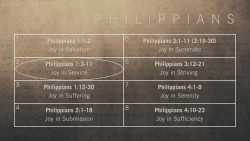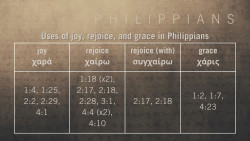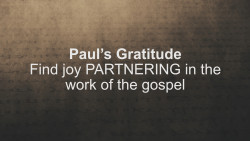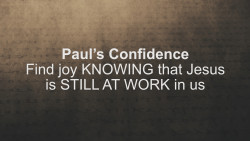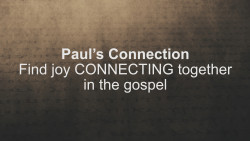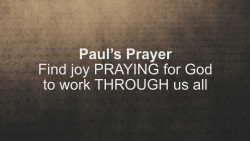Philippians - Part 2
Sunday message.
Discover the connection between joy and grace in this sermon as Pastor Jamie emphasizes the concept of joy as a state of being rooted in grace and explores how recognizing God's grace can transform your life and relationships.
MP3 Audio
MP3 Transcript
View an A.I. generated full transcript of the audio.
Okay, so, kids, I need your help. I need you to help the adults in this room find Philippians 1:6. Can y'all do that for me? Help your mom or dad find Philippians 1 6. That's where we're going to start today.
In fact, then I'm going to challenge you adults. I think we need to teach the kids a song this morning. And it's a song you may not have heard in a long time. And I'm not sure that some of our kids know this, but I need you to help me sing it. Especially if you grew up like me, going to Bible school, where you would gather outside and you got in a line according to your age and someone was carrying all the flags and the Bibles.
Y'all remember all that? And so you'd walk in and you'd kind of just kind of march and we do the pledges and all that stuff. But there was a song that in Sunday school and VBS that I learned. And I hope these kids might pick this up. It's a really easy tune and I bet you're gonna recognize it.
Y'all didn't know I was gonna sing a solo today, did you? Alright, kids. And listen, though, if you know the song, I need you to sing out with gusto. Can y'all do that? I've got the joy, joy, joy, joy down in my heart down in my heart down in my heart I've got the joy, joy, joy, joy down in my heart down in my heart to stay now sing it again.
I've got the joy, joy, joy, joy down in my heart down y'all clap. Down in my heart I've got the joy, joy, joy, joy down in my heart down in my heart to stay now stop. Let me show you how some of y'all sang that song.
I've got the joy, joy, joy, joy down in my heart. Now, I want you to think theologically about what this song is saying. I've got joy down in my heart. Where? Down in my heart.
There are times in life when you have joy, but you ain't happy. But that don't mean the joy is not there. It's kind of like love. I could say to someone, I love you. And sometimes I don't feel that love.
Like you walk into your house and your kids have made a mess of your kitchen and you're sitting there, oh, in Jesus name, if I could get my hands on them. I love them so much.
Because joy is like happiness or any other emotion. Just because you're not expressing it does not mean that it isn't there. And as we dig into this study of the book of Philippians, I want us to keep in mind that joy, as Will shared with us last week, is so much more than just the emotive expression of it. It's bigger than that. Number one, he shared with us that it is a fruit of the Spirit, that if the Spirit of God lives inside of me, I have joy, but it's also a state of being.
He talked about how that when we're in the presence of the Lord, according to the psalmist, that we can experience the fullness of joy. But a lot of us in this room, if we've lived long enough and some of us have lived longer than others, we have just reason to not have joy. That there is things that have happened in my life, the accumulation of conflict and unresolved tension, that today I'm sitting here and I can verbally say, I've got the joy, joy, joy, joy down in my heart, but I'm not living it. I'm not recognizing it. In fact, I want to give you a definition of what I believe.
Joy is very simplified. And when I give you this definition, it's only three words. I mean, it's very, very simple. It's a very, very, very definitive definition. And I'm going to explain why I believe that this is what joy is.
Joy is grace recognition. Joy is grace recognized. In other words, your entire existence, spiritually speaking and physically speaking, rests upon and depends upon the grace of God. If you look back at your life before you knew Christ, you go, lord, you saved me from a lot of stupid things. The grace of God.
And then when you came to know Jesus, the only way that you know him is because of the grace of God, for it is by faith you have been saved through faith. You see that faith is the medium by which the grace of God comes in and impacts your life. And it is grace that is transforming and is changing us here and now. And so joy is this position. It's this security.
It is this place. Grace recognized. And as we explore, I want you to look at this slide. It's in your bulletin. But I want you to see where we're going in this study.
Because if you picked up one of these or you're using your own Bible, this is where we're going to go. I put the numbers of the weeks up here. Last week, Will again did a great, fantastic job of challenging us to have joy in our salvation. And we're saved by grace alone. This week, we're Going to kind of pick back up in that because I want to chew apart this beautiful paragraph.
In fact, the Book of Philippians. The Book of Philippians is probably the most upbeat book that Paul wrote. If you want to do some cool word studies, look for the word sin in the book of Philippians. You won't find it because Paul isn't necessarily writing to correct them like he had to do the Corinthians and the Ephesians. But even in those churches, every letter that Paul wrote, he wrote opening, saying, grace be to you.
And he closed the book saying, let the peace and the grace of God be with you. In some fashion or nuance of that, he placed everything upon the grace of God. And grace. Grace is the very foundation of why we exist. And so therefore, when I say that the joy of God is in my heart to stay, I may not be feeling it.
I may not. I mean, I'll be honest with you. Friday morning, when it started to snow. I mean, the snow is beautiful. But that snow brought me no joy until I began to see my kids, even though they're teenagers and almost adults, start putting on their old snow bibs and putting those boots on and going outside.
And the first thing they did is they built a snowman on the front of my pilot, and we named him Pepito.
But you know what I began to do? I began to reminisce about snow days in the past, thinking about my little kids as I'd sit down with them as little children and make the snowball for them and then they throw it in my face.
But it brought me joy. You see, joy again is grace recognized. It's there, but it's on me to let that grace live out. And listen, I want to be really serious with you. I want everybody to look at me eyeball to eyeball.
If you're struggling with joy, it might be because you're struggling with understanding God's grace. If you today can't find one single thing that can bring you joy in your life, I'm going to tell you there is one foundational thing, and that is the grace of God. And you'll say, well, you don't know what's going on in my life. You haven't experienced the conflict and the hardships, and I haven't. I've experienced my own.
But the one thing that's been constant in my life has been Jesus Christ. When people have let me down, when situations have let me down, when my bank account has let me down. Hello. When the grocery store has let me down, Jesus Christ has never let me down. And if I'm going to have true biblical joy, it's got to start with the man who can give me joy.
So I want to invite you to stand with me as we read this one verse. In fact, it's going to be on the screen, so can we read it together? And I want to challenge you that as we're going through this study, I'm going to have a specific verse every week. We did this with First John a year ago. We'll do it again.
Let's memorize some scripture. I have hidden your word in my heart that I may not sin against God. Let's put some stuff in our heart that we can draw from. And this is one of those. Let's read this together.
I'll try to do this the best way I can. Choral conduct For I am confident of this very thing, that he who began a good work in you will perfect it until the day of Christ Jesus. Wow. Whoa. And guess what?
That's not even a complete sentence. So that means we got to look at this in context. So, Father, as we dig into this verse today in this short amount of time, I pray, God, you help keep us attentive to what your word is saying. And, Lord, I pray that as we leave today that we would rediscover the fullness of the joy that we have in you. In Jesus name, amen.
So let me geek out for a minute. Y'all didn't think I wasn't going to geek out, did you? I want us to look at this chart here. Now, I don't want to. I'm not trying to impress you with my Greek skills because I'm a novice at best.
But what I want you to understand is that there is in the Greek a little bit of a connection between the word for joy and the word for grace. They come from the same root word. So as we are studying the book of Philippians, we look at the word joy, and you're thinking, we're going to preach on joy for eight weeks. But it only appears five times in the entire book. But here's the truth.
Every time it appears, it appears with weight. It appears with intention. So the Greek word korah, it literally means this. It does have this emotional side to it of exuberance and celebration and happiness. But it is also a state of being.
In fact, if you look at the next column, that is the word rejoice, and they go hand in hand. That joy in my life causes me to rejoice. When you study the Old Testament use of the word joy and rejoice. There is more usage, and you can even see it here of the expression of joy than there is of the state of being of joy. I mean, let's flip this around.
If things had gone a different way and it was Georgia going to be playing in the national playoff last week, a lot of you be going, woo hoo. Yeah, but right now you're going. You see how conditional we make joy. Sometimes you need a joy that's not conditioned upon whether your team is winning or losing. You need something that has been deposited deep in your heart.
So as we get into Philippians 2 and it says that God wants us to work out our salvation with fear and trembling. That's not sadness. That is that God has put something in you and me. And I can tell you the truth, this world does not want to accept a gospel that is ho hum. The world needs to see a gospel that has transformed people's lives for the better.
But wait a minute. But don't we suffer as Christians? Yeah, we do. But you know what the world needs? They need to see Christians who suffer with joy.
And so you can see that in fact, there's two little uses in chapter two that I can't wait to get to. That is an extension of the verb used for rejoice, which means to rejoice with. In fact, what he's going to do is he's going to invite them. Look, I'm in prison and I'm writing to you for a specific purpose and I want you to rejoice with me. Lastly, this last column, and I know you're going to think, wait a minute, you just spent a lot of time talking about grace.
I did. He opens this book with grace in 1, 2. He closes this book with grace in 4, 23. And he uses grace one time. But again, he uses it with great emphasis.
Because what we're going to study in just a minute is that Paul is inviting them. I want you to partner with me in the work grace, and that in our partnership there can be joy. Say joy. See, I mean, we sang it a minute ago, but now we're. I mean, these words, if I know you, I mean, you may not recognize the Greek letters.
That's okay. There's only two letters difference. The root is the same. In fact, I'm jumping around in my, in my notes here. But I want you to hear what Jeff Bromilly said about this.
He said, in short, biblical Old Testament joy was not joy bottled up. Did you get that? If we're going to have joy expressed in our life. A fruit of the Spirit. To bottle up that joy is a quenching of the Spirit.
Hold on with me. Listen, I'm telling you. You could go around and be the grouchiest Christian you want to be. But don't be shocked when somebody questions whether or not you're a Christian. Love, joy, peace, patience, kindness, goodness, faithfulness, gentleness and self control.
Against such there is no law. If the Holy Spirit of God lives in my life, there is something deposited in there that ought to produce rejoicing and joy in my life. And if it hasn't happened, my heart breaks for you. That either A, you haven't let go of what's going on in the past, or B, you're holding on to something that is continuing to bring you down. And today Jesus Christ can liberate you from those things and put a new song in your heart.
Don't you want to live that way? Or you want to continue just sludging through the life like you're walking through a bog in a marsh where you can barely pick your feet up and put one in front of the other? No, I want to live on a dry land on a solid rock where I can run swift. I don't want nothing holding me down. If there's unforgiveness in your life, you know what unforgiveness does?
It only puts shackles on you. Unforgiveness never affects the other person. All it does is chain you up and hold you down. Don't you want somebody to come with some big old chain cutters and cut those things off of you? Jesus Christ can.
And he can instill the joy that you and I need to live this life. So let's just. I don't know, let's just go to this slide for the next slide for a second. So I don't know how many of you got the journal. This is the copy of my page.
And I warned you last week that you might see in its diagram. But let me teach you. Let me do some teaching right now. One of the tools in Bible study is to take a moment and identify key words. You want to do some cool?
Listen, I mean, some of you did some Bible reading plans, but can I challenge you this year to kind of put cruise control on and maybe study what you're reading, not just read it. So one thing you can do is you can go, okay, I'm going to pick a couple, two or three words, all right? And what I did here, I know you can't see it microscopically, but I have went through my little journal, and I've highlighted joy and rejoice everywhere it occurs. And then I wanted to see how Paul used it in his other letters. Okay, so that means you need to either use.
There's all kinds of programs out there online and things you can buy, but find what's called a concordance. And in that concordance, you can look up the word joy, and you can find where else it's used in Paul's 13 letters and begin to read how is Paul using the word joy? And then back out even from there, and look at all of the Bible, and between all of that, you can kind of narrow in and find the definition of joy. And when you do, what you find is the same thing. I found that it's not necessarily an emotion.
It is that state of being, that place where grace is recognized. In fact, if you also look, you see all those little arrows I drew? First arrow up there is under the word partnership or fellowship. That word is koinonia. That's exactly what it means.
It means fellowship. So, any Lord of the Rings fans in here? All right. Fellowship of the Ring. When you read that verse, I want you to think fellowship of the Ring.
What was the Fellowship of the Ring? It was a group of people who came together with one purpose, to destroy the ring. Am I right or wrong? Because I've not watched all the movies, I think I'm right. Well, there's something that's bringing them together.
In fact, if you go down to the word partakers, it's the same word again. It's very important to Paul at the onset of his letter that they're doing what they do, and they do it together. And so I also drew arrows and I circled everywhere Paul expressed emotion. In fact, if you look in verse number. In verse number seven, he says, it's right for me to feel in verse number eight, how I yearn with all of the affection.
In fact, actually, it's plural affections. In fact, it's a moving and a stirring in the gut. In fact, King James, I believe, says the bowels of Jesus Christ.
Listen, I don't know about you, but. But some of you ladies in this room have never got that kind of love letter from your husband.
He loved these people. Why did he love them? Who are the Philippians? Do you guys remember in our study of the Book of Acts? Who are these people?
Paul shows up in Philippi and goes down to the primary river at the mouth of the city, most likely where there was a gate. And they were down there doing work when this river was deep enough that boats could come in and out. And Paul goes down there, and he meets a lady from Thyatira named Lydia. And God opens her heart and makes her aware of her need, and she gets saved. Brings them into her house.
The next day they go out, and this demon possessed girl is taunting them, and they free her from the demon. I'm like, whoa, this is awesome. But then they take them and they beat them, and they throw Paul and Silas in jail. And they could have just sat down and they could have sang I got the joy. Joy, joy, joy.
No, it said they began to sing. And at midnight, the jail shook and the doors came open. And this Philippian jailer comes in and discovers them all open. He's like, oh, my gosh, what am I going to do? He draws a sword, and he's about to plunge it into himself.
And they say, stop, we're still all here. And that jailer gets saved, and then his household gets saved. And you know whose house they go back to? They go back to Lydia's house. All within one chapter.
You see this great experience that Paul has with these people. And now he's writing to them saying, I yearn for you. I long for you to succeed in Christianity. And I'm celebrating that. And so as you look on the left there, you can see where I put those brackets.
You can see how Paul expresses his relationship with them. You are partakers with me in the gospel. And then he expresses his affection for them and how he yearns for them, not only just to be with them, but to see them. And then the third one, that Paul expresses his confidence that they would grow in their faith. And I think there's some things we can learn from this.
So point number one. Let's just jump right into this. When I find point number one. Point number one says this. Find joy partnering in the work of the gospel.
Find joy partnering in the work of the gospel. Listen to me. If you're married, when you found that special someone, there was something primary that you guys had in common. We've talked to our kids before about their common interests. And our oldest, Emily, she loves.
Loves to be outside. She loves to hike. She loves to. She does waterboard, all this. She loves to be outside.
Well, here's the truth. Whoever that man is, for her future, if he don't like being outside, that can be a problem, because she loves to be outside. Now, I want you to think for a moment. If you're married, you're dating. I want you to think like, what was that common thing that drew me to that person in this book?
There is something that's in common. There is something that they both value. There is something that knit them together. And it's the gospel. You see, the reason that Paul felt like he had such a great relationship with them, the common factor, the common value was the gospel of Jesus Christ.
And so us sitting in this room today, you're here for a reason. And I hope that if you're not there yet, that you are working your way, that you would also embrace the same vision that the same value that we have, which primarily is the gospel, leading the broken to hope in Christ, that we help others connect, that we own our faith, that we pursue God daily, that we extend his hope. Why? Because we're a place of hope. We're a people of hope.
We are Ebenezer. That's why we exist. It's what knits us together. And Paul from the beginning is saying, we are partnering, fellowshipped together for the gospel. Jump in the text with me for just a moment.
Verse number three. I thank my God.
You want joy to erupt in your life? Start with how you thank God, and for what you thank God. Too often we excuse our lack of joy because we will. Honestly, if we're honest, we would say, you know what? I really don't have anything to be thankful for.
But I'm telling you right now, if you would step out and look at it from a different perspective. First of all, I thank my God. Paul could have said, I thank God, or he could have said, I thank the God, but he said, I think my God, God knew him. And he knew God, just like Will shared with us last week, that in that unity, in that fellowship, in that intimacy, he knew God and God knew him. And that's his starting point.
I thank my God in all of my remembrance of you. As he thought about the Philippians, as he thought about Lydia, as he thought about the jailer, it brought into his life. Thankfulness. When you think about those in your life, does it produce thankfulness within your heart? Come on.
Right now, I want you to think about somebody in your life of which you can say, yes, I'm very thankful for them.
But now I'm going to flip that coin over. Now I want you to think about the person in your life that is a thorn in your side. Now wait a minute. Remember I told you that the Corinthians and to the Ephesians, he both wrote to them and Said, I thank God for you. Even though they were causing him problems, causing him headaches, causing him heartaches, threatening to desert him.
In fact, many believe that Paul was writing this letter not to correct them, but to warn them, because they were going to desert him in this work. They were tempted to say, you're in prison, Paul. We don't want anything to do with that. And Paul's bringing them back to this common thread that he found joy, partnering with them. In the Gospel verse number four, he says, always offering prayer with joy in my every prayer for you all.
In fact, really the end of that sentence, the word order says, with joy, the prayer making. This word for prayer here is not the general word for prayer. It's the word for request. So what he's saying here is, I'm offering requests with joy in my every prayer for you all. Why he's thanking his God as he's remembering them.
And because he's remembering them, it's producing joy, warts and all. When he thought about the Philippians, he thought about the one common thing that drew them together, the grace of God. You and I have people and situations in our life that hurt. By no means do I want to diminish the pain that some of you have experienced in your life. But what I'm saying is God's grace is so much bigger than anything that we can ever face, even in our own deaths.
God's grace is bigger than anything that we will ever face. And in those bad times when we're at our worst, when we're like a stubborn child pitching a fit, God is right there. God is right there holding us. I think I've told this story before about Emily, but when she was little, she had night frights. In 2007, I had sinus surgery, and Emily was having a night fright.
And I went. I was just two weeks after surgery, and Emily, in her night, she didn't have a. It was like she was in a sleepwalk fit. If you want to. She popped me in the nose and tears ran out of my eyes.
She had no clue what she was doing. But I remember nights when I would just hold her as she's kicking and flailing, and she had no idea because she was asleep. And I'm just. I remember the Lord touching my heart one night and saying, you know what? Sometimes that's the way you act, kicking and screaming.
And I have to hold you because I love you. And today we need to be reminded that no matter what we've been through, God loves us and he draws us to himself. And in that, I can have joy. Why? Because he found joy in the partnership that they had for the gospel.
Look at verse 5. In view of your partnership in the gospel from the first day until now, what would have been the first day? That little riverfront when a lady named Lydia accepted Jesus Christ and it changed the landscape of her life, and it changed the landscape of other people's life. And they didn't realize it probably at the moment, but when they were accepting Jesus, they were signing up to be a partner in the gospel. That's easy for us to sit in this room and say, well, you know what?
That's what preachers are for. Preachers are for up there to tell us why we need to be saved, how we can be saved. And no, no, no, no, no, no. It's all of us. If you've been saved by the grace of Jesus Christ, you have all you need to share with somebody else so that they can be saved.
The gospel isn't vested in the thrust of your story. The gospel is vested in the grace of God. Yeah, your story might open the door for you to be able to share the gospel. But has the gospel changed your life? Has the grace of God impacted your life, helping you to see what you were saved from and where you are today?
That's why joy is grace recognized. Because when I see and realize I've been saved from my sins, I was destined to future judgment, a judgment that I couldn't pay for. And now I'm coming along with other people who've accepted that same truth. And we're living to make that gospel known in this world. And maybe the reason.
Maybe the reason we don't have joy is because we've turned the valve off and I'm not expressing the joy as I should. So my question to you is, how can you joyfully participate and partner together for the cause of the gospel? Where are you in that spectrum? If somebody had. If you had to rate yourself on how engaged you were in the gospel mission, would you be a one or a ten?
Or would you be somewhere in between? Because he's calling us into the same kind of partnership. Point number two, because here's the truth, and I believe this about every one of you, and it gives me joy to look out at all of you and you joining us online and older friends and older people that I've known for years and years, it's this. I find joy knowing that Jesus is still at work in us.
Okay, kids. We used to sing a song sounded like this. He's still working on me to make me what I ought to be. It took him just a week to make the loving and gracious he must be. Did you see that?
He's still working on me. How loving and gracious he must be. Some of you in this room, you've given up on Christianity. You haven't given up on faith, but you've given up on Christianity because you think you're too bad for God to use you. And I'm here to tell you God is not finished.
I am confident of this very thing, that he who began a good work in you will see it to perfection completed until the day of Christ Jesus. See, he didn't set the timeline. Catch this. He didn't set the timeline on your lifeline. He set the timeline on his.
I don't think you understand that he's speaking to them in the plural. Yes, this verse is talking about the transformation in my life, but he's talking about the yearning for the day that the Son of God will crack open that sky and trumpets will blow and the dead will be raised and all of us will be transformed to be taken up together with him. That is the curtain call, and it's not yet. We have not finished the work. We are in the work just as much as Paul was and the Philippians was and the Ephesians was.
We're as much a contact as those who in the Reformation began to spread the news that were saved by grace alone. We're as much in this as it was 2000 years ago, as it is today. We are a part of Paul's confidence that he will do his work and it transcends our lives, it transcends our time. It really is beyond anything we can imagine, that we are a part of a work that has continued for over 2000 years and it's not done yet. Are you in it to win it?
Because until he cracks open that sky, we have no reason to sit back and go, well, there's nothing else left for me to do. I don't care if you're 85 years old. You don't retire from the work. You don't retire from the work. I don't care if you're 7 years old, you're not too young for the work.
I loved it this week when Timothy wrote in one of our staff channels that you kids had taken serious, that we want to see more invitations this year. And we had over 80 something people just in the kids area alone Wednesday night. That's fantastic. Wait a minute, are you talking numbers no numbers tell a story. And the story that Timothy interpreted was that you kids, thank you for taking serious, that you've got classmates that don't know Jesus Christ, thank you for taking serious, that they can come to a loving place and hear about a loving God and hear about the gospel of Jesus Christ that says, thank you parents, thank them that they take it serious.
For our student ministry and how we kind of reworked some of that Wednesday night and to see that we had over 70 something middle schoolers here Wednesday night. Why? Because the middle schoolers are taken serious. That I need to invite my friends to a place where they can hear about Jesus Christ in a loving environment that cares about me. And adults the same thing.
We need to catch this fire, that we need to create a space and a place, place where they can hear the confidence that God is not finished with them. Here's my question. Have you given up on God's work in you? You see, Paul thanked them as he thought about them. He thanked them for their partnership and now he's thanking God that he's still working in them.
Have you given up on God's work in your life? Have you decided? No, I've arrived, I'm done. There's nothing else left. No, there is.
Don't sit down. Look at the third point, Paul's connection. We need to find joy connecting together in the gospel. And this is where he gets intimate, he gets emotional. He says, for it's only right for me to feel this way.
In other words, he's saying it's logical. It's only logical for me to feel this way because I have you in my heart. A very affectionate term. You are in my heart. What?
What's in your heart? If you could take your heart out and kind of dissect what matters to you most, what would you write? Well, maybe. How could you determine that? Well, I can tell you how to determine that.
Look at what you spend your time doing.
Because some of you are wasting time on things because you're numbing things that are in your heart.
Some of you doom scroll, you get on Instagram or Facebook and you sit there and you just endlessly watch reels. Some of you teenagers, you get on YouTube and all you watch is reel after reel after reel after reel. My question to you is, what are you numbing? There's something down in your heart that you're numbing when you do that. That could be overeating, that could be drug abuse, that could be overworking.
Whatever it is that's distracting you. Look at the way you use your time and how you're expressing your time. And you can find very quickly what's down in your heart. Well, wait a minute. Well, what do I do?
What do I do if I discover there's something down in my heart that shouldn't be there? Spend more time with the Lord. Read scripture, pray. Go back to verse three and make a list of the things that you're thankful for. You've got to renew your mind into things that are positive.
And don't focus on. On the negatives. Listen to what he said in verse. As he continues in that verse, he says, since both in my imprisonment and in the defense and the confirmation of the gospel, you were partakers of grace with me. Again, he's thanking them.
Look, you haven't given up on me. I'm in prison. Don't take that as something bad. It's something good. Because the gospel is continuing to go out.
This is my defense. This is my apology. I've ended up in prison for the cause of Christ, which means I must be doing something right. But now I'm able to. To take this gospel even into a different arena.
A lot of times we get something bad happens to us. We get mad at God and we shake our fist at heaven. Say, God, why would you let this happen to me? And we never open up our options that maybe God's put us in a place for such a time as that. Have you ever thought that way?
Have you ever stopped yourself in the moment to think, well, God, maybe you've got me here for a reason, and I can ask God to take me out of it, but maybe I need to think like Peter who said, but to the degree that you share in the sufferings of Christ, keep on rejoicing so that at the revelation of his glory, you may rejoice with all rejoicing because we're striving to the day we're called for a specific reason. He goes on in verse number eight. For God is my witness. How I long for you. With all the affection of Christ.
I look at that two ways. Number one, Paul's not conjuring up his affection. His affection came from Jesus. And also he's mimicking the affection of Jesus. How much did Jesus love you?
I want you to. You know, we just finished Christmas season, but I want you to get a picture of the cross for a moment. Jesus spilled out his blood and died an agonizing death because he hated the sin in your life. And even to this day, I wonder sometimes how God looks down on us when we continue going right back to the same sin that his son died for. What does that stir in your life when you think about that way?
All of us go through so many different things. Maybe it is a school shooting, a hurricane, the loss of a loved one or a leader or a natural disaster. But I'm convinced that the joy that God has deposited in us is the unifying thrust that can keep us focused on the grace of God. So who am I connecting with to further the gospel? How am I seeing that good work working itself in us?
But here we are, and we're looking at our lives and some of us are living Christianity and we're doing a solo run.
We actually think that we can be a Christian by ourself, but that is not God's plan. He said, it is right for me to feel this way. I yearn for you with my gut. I yearn for you with the affection of Christ.
Can I challenge us to think somewhat this way? When you leave this place today, don't turn the switch off. I want you to think of five people that sit in this room with you that you can sit down and say, God, I thank you. I thank you for Fred Lodge. Let me tell you why I thank God for Fred Lodge.
Because two and a half years ago, when I met this man, he saw something in me. Honestly, Fred, there were some things you said about me that I did not see about myself. And you supported me in a way that I'll never be able to repay you back. Thank you. Thank you.
Phil. Where's Phil? He's way back there in the back. Phil, that Sunday morning you came up to me and said, I don't know what you're going through, but I'm going to pray for you. Thank you.
See how that works? I could call out all of you, I'm singling out two guys. But I'm telling you, when you focus more on thanking God and thanking them for what God's doing in their life, all of these things will begin to grow strangely dim. That last point, I know I'm out of time. And kids, y'all have done great.
Can y'all parents let the kids know how much we appreciate them sitting there and just paying attention? And, hey, you're learning what it's going to be like in a few years when you sit in this room. So there you go. I want you to look at verse number. Excuse me, let me back up.
I got to give you that point before I go on far, find joy praying for God to work through Us all. If the gospel is the very thing that knits us together, then why don't we work on that together? Let that be the common cause, the common value. And we could come in here and we could present a whole lot of crafty ways to tell you what we believe in as a church. But listen to this.
This is 9 through 11. He says prayer. Listen to what he prays. And I pray. This is the different word.
This is actually connective prayer with God. That your love, that your love may abound more and more. So the first thing he hits on is love. The very essence of Christianity is based upon the grace and mercy of God. And if love is not living through me, then I really need to say, God, has your grace impacted me?
Did you see? Listen, you want to pray a prayer for somebody else or yourself, pray that God would help you to love more and more. Well, what does that look like? Well, that looks like, well, two sides. When I have issues with people, I take it to Jesus.
I don't go gossip about them. I don't go run my mouth around them. I don't go and say, hey, did you know what? So and so did I don't gossip about them. When they offend me, I'm quick to forgive, I'm slow to speak.
I want that kind of love. And then on this other side I'm going, you know what, Lord? How can I impact somebody's life today? How can I impact the stranger I meet on the street? How can I impact the person who lives down the road from me?
How can I do that in a way that look what it says, that brings forth knowledge. He says that your love may abound more and more in real knowledge and discernment. This isn't an emotional thrill like a lot of times you come to church and you have this emotional like, woo hoo and you go out and you're ready to storm hell with a water pistol. That's not what this is talking about. This is talking about love that makes sense and that I'm discerning it as God is leading it.
Verse 10, so that you may approve the things that are excellent in order to be blameless and sincere. And there's that phrase again. Until the day of Christ Jesus. Listen folks, we want to live in our timeline and God is calling us to live in his timeline. Our life right here matters and it matters in the umbrella of eternity so that we would be blameless and sincere.
What's he talking about? He's talking about sanctification. This prayer is so beautiful. That you would be loving, that you would have knowledge and that you would be purified. Purified.
Ready to stand before the Lord with no reason for blame. That I wouldn't stand before him and say, well, Lord, when were you sick and when were you hungry and when were you afflicted and when were you in prison? As the goats will say. And what does Jesus say to the goats? Depart from me.
I don't know you. But then the sheep remember when Jesus told the story, he looked at them and they said, gosh, we didn't know that was you. Don't you want the kind of affection from your gut that appeals to somebody else on the basis of grace in the gospel that can produce joy when you make a difference. In fact, look at the last verse. He said this would produce fruit, the fruit of righteousness.
Yes, the Holy Spirit produces the fruit of the Spirit. But through that, as I'm living out my faith, it begins to produce the fruit of righteousness which comes through Jesus Christ and Jesus Christ alone. You can't produce your own righteousness. He imputes it to you because of what Jesus did on the cross. I'm just a medium through which it gets expressed.
For what? For your glory? For your honor? For your reputation? No, for the glory of Almighty God.
So let's recap that. We want to find joy partnering in the work of the gospel. We want to find joy knowing that Jesus is still at work in us. Find joy connecting together in the gospel and find joy praying for God to work through us. And that all leads us to one big statement that we can find joy in growing together to serve.
Some of you posted, reposted a meme on Facebook this week, talked about that you're missing out on church. Until you step into that place of service, it's incomplete. Why? Because you don't own it. Until you find a place where you're giving of yourself to others, you're not reflecting the self sacrificing attitude of Jesus.
That's where we're headed. In chapter two, this book kind of does this number. It kind of builds into that point where it exalts Jesus and his sacrifice. Then Paul backs it right back out. But in all of that, that end cap says the grace of God has impact to the life.
That no matter the circumstance, no matter what you're going through, you can find joy. And Paul thanks them for their partnership, Paul thanks them for their relationship. And then he prays for them that they would excel in their faith. So here's my concern. If Paul was Writing for concern.
Not to get onto them, but their concern. Here's my concern today. Does this attitude describe your faith journey? When you read verses 9 through 11, does that describe you? Or do you want it to describe you?
That you're abounding more and more in love, that you're discerning the knowledge and will of God. That you are striving for purity and sincerity, longing for Jesus Christ to return. And in doing all of that, that people see the fruit of righteousness in your life. Not legalism, not being like a Pharisee, but in humble response, we're proclaiming the glory of God. Does that describe your life, or do you want it to?
So here's what I want to challenge you. I want you to stand up. Y'all have done so good, kids. I appreciate you sitting here and doing all that. Maybe you could get a double portion of hot chocolate in a little bit.
And all the parents said, no way. Here's what I want you to do. I want you to bow your heads. Because all of us in this room, we've got something that's trying to rob our joy. And as a pastor, there's nothing that breaks my heart more than just seeing somebody who's stuck in joylessness.
But you know what? I do think that there's a key here. You can find joy when you put your weapons down, stop fighting your brother and your sister. Learn to forgive God. Learn to forgive yourself, learn to forgive others, and let it go.
And right now you can start that by saying, lord, this has been a thorn in my life for way too long. I'm going to give it to you. And I think you need to call it out. I think you need to say, God, I've had tension with my brother, and it's robbed my joy. I'm giving it to you right now, but then I want you to balance that.
Then I want you to say, God, how and only you can answer this question. Only God can speak to your heart. How can I take a step in partnering with the gospel? Primarily through serving so, Lord, as we sing this song and get ready to lead, I pray you speak to our hearts, Lord. Show us what our next step could be.
Show us what we could do to grow in our faith, to take a leap that we can make an impact. And in doing so, Lord, we might be shocked to find that it may erupt. Enjoy in our life. We love you. In Jesus name, amen.
More from the Philippians Series
- Philippians - Part 1 - Joy in Support ... (January 5, 2025)
- Philippians - Part 3 - Joy in Suffering ... (January 19, 2025)
- Philippians - Part 4 - Joy in Submission: Unity in Christ ... (January 26, 2025)
- Philippians - Part 5 - Joy in Submission: The Example of Christ ... (February 2, 2025)
- Philippians - Part 6 - Joy in Submission: The Work of Christ ... (February 9, 2025)
- Philippians - Part 7 - Joy in Surrender: Giving Up ... (February 16, 2025)
- Philippians - Part 8 - Rejoice in Pressing On ... (February 23, 2025)
- Philippians - Part 9 - Joy in Surrender: What's to Come ... (March 2, 2025)
- Philippians - Part 10 - Joy in Serenity ... (March 9, 2025)
- Philippians - Part 11 - Joy in Sufficiency ... (March 16, 2025)
Weekly Bulletin



